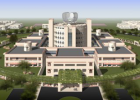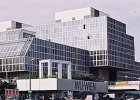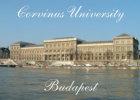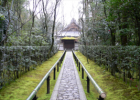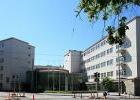溫筠
歐洲,荷蘭
風管系 溫筠
A. RSM Introduction
Rotterdam School of Management is part of the Erasmus University located in Burgemeester Oudlaan 50 in Rotterdam, The Netherlands. It is a world leader in
research and teaching on sustainability. According to the Aspen Institute's Beyond
Grey Pinstripes Report, RSM ranks 7 out of 100 globally and first in Europe (2009).
As one of Europe’s largest international business schools, RSM reaches an expansive
international audience of future and current leaders through its portfolio of
programmes, services and academic activities.
RSM is an international university, in which you can meet talents from around the
world. The English level of its students is very high so you don’t need to worry about
communication problem. They also provide various English-taught courses, which is of
great benefit for international students.
In bachelor course, a year is divided into three trimesters. For exchange students in
Spring, you can choose to stay for trimester 2, or 3, or both. For Fall exchange
students, you can only stay for trimester 1.
Courses at RSM are denominated in ECTS (European Credit Transfer System) credits.
60 ECTS represent the workload of one full year of study. 1 ECTS is the equivalent of
28 hours of study, and includes e.g. lectures, writing of papers, team assignments,
reading, independent study and preparation for exams, and the exams.
The fulltime workload during one complete trimester is 20 ECTS. The required
(non-negotiable) minimum workload for exchange students is 15 ECTS per trimester
(these 15 ECTS should be obtained by doing course from RSM only). There is a
maximum of 30 ECTS per trimester. However, it is recommended not to take more
than 20 ECTS for one trimester if you still would like to travel around Europe.

B. Courses Introduction
The followings are the 7 courses I took in trimester 2 and 3:
1. Business Information Management
This course aims at providing a deeper understanding of the issues, challenges and
opportunities in this area, with a specific focus on the alignment of IT and a
company’s overall strategy. The course emphasizes an organizational and
managerial approach to IT and Information Management.
The textbook for the course is: Information Technology for Management;
Improving performance in the Digital Economy by Turban & Volonino, 7th edition,
Wiley, 2010. 1/3 of the exam is based on the text book and other blackboard
literature, 1/3 is based on materials discussed during the lectures and 1/3 is based
on material discussed both during the lectures and in the literature.
2. Cross Cultural Management
The overall purpose of the course is to provide students with means to cope
with diversity and complex realities of multicultural societies. Students should
be able to identify cross-cultural differences, detect value clusters and
successfully conduct research and managerial/consulting activities across
cultural boundaries.
The textbook for the course is: Reader “Cross-Cultural Management”The Grade
is based on the midterm exam and the three group projects.
3. Financial Accounting
The objective of this course is to help you become critical users of financial reports.
Achievement of this goal requires an understanding of the basic principles that
underlie financial accounting, as well as an appreciation of the amount of
judgment required in applying these principles. In addition, you should gain an
understanding of the limitations of financial reporting and the impact of
alternative accounting choices on the financial reports. Topics include: institutional
setting and fundamental concepts, measuring and reporting assets, liabilities and
net income, share capital, consolidated accounts, interpretation of financial
reports and business ethics.
The textbook for the course is: Elliott & Elliott, Financial Accounting and Reporting
13th edition, 2009. Pearson Education Limited. The final grade is 100% of the final
exam.
4. Human Resource Management
The course’s objective is to provide a generic insight in the fundamentals of
Human Resource Management. As the course focuses on the human aspects of
topics that are discussed in other IBA courses (e.g., Marketing, Strategy and
Finance), it provides complementary insights that are managerially relevant. These
insights are helpful in understanding interdisciplinary business problems. An
important note here is that HRM tasks are seldom the isolated responsibility of an
HR manager. In practice, the “HR Function” is more and more the domain of line
managers in firms.
The textbook for the course is: Noe, R.A., Hollenbeck, J.R., Gerhart, B., and
Wright, P.M.: “Fundamentals of Human Resources Management: 3rd Edition.”
McGraw-Hill, New York, 2009. The grade is based on final exam, individual case
assignment and a group project.
5. Business Law
The lectures will provide an overview of certain areas of law of importance to
those involved in business and management. The legal element of this course will
focus on the business law of common law jurisdictions (UK, USA). The reason for
this focus is twofold. Firstly, the language of international trade and commerce is
English, and consequently so is the international language of legal negotiation and
documentation, and an understanding of English legal terminology is therefore
useful. Secondly, due to the international character of the student body in the IBA
program, texts must be accessible in English. Nonetheless, where relevant,
comparisons will be drawn with the legal approach in civil law systems, like the
Netherlands. The emphasis is on the general legal problems that may concern any
business enterprise. The law of the UK and USA is used to illustrate the way in
which certain jurisdictions deal with particular legal problems.
The textbook for the course is: Helen Gubby, English legal terminology: legal
concepts in language (Boom Juridische Studieboeken), second edition 2007. The
grade is based on two midterm exams and final exam.
6. Supply Chain Management
The course program presents cases of real-world situations calling for appropriate
state-of-the-art models and solution methods for the design, control and
operation of supply chains. Supply chain management is vital to companies that
operate in such chains. Proper planning and managing of the supply chain can
make the difference between a successful business and an outright failure.
The textbook for the course is: Simchi-Levi, D., Kaminsky, P. and Simchi-Levi, E.
(2008), Designing and man. The grade is based on two individual case assignments
and the final exam.
7. Technology for Managers
The objective of this course is to give you an insight into a sub technology of
High-Tech Systems and into the possibilities of what this sub technology can offer
a company. In this course you learn to analyse a sub technology of High-Tech
Systems and discover how this technology can be exploited by a company.
Students from RSM and TUD combine their knowledge in order to complete the
assignments.
There’s no textbooks or exams for this course. The grade is based on the three
group reports and the final presentation.
C. Life in The Netherlands
The reason I chose to have my exchange in Holland is that the English proficiency level
in Holland is among the highest in Europe. Dutch people are also more open and
friendly to foreigners. Here are some facts about the Netherlands:
Language:
Dutch is the national language of Holland. However, English is spoken by almost
everyone. In addition, many Dutch people speak German and French.
Size:
Holland is quite small, the surface area is 41,528 square kilometres. Holland is one of
the most densely populated countries in the world. It has a population of sixteen and
a half million and an average of over 400 inhabitants per square kilometer.
Food:
Lunch is usually bread and butter meal, the same as breakfast, perhaps served with
thinly sliced cold meats. Dinner may be pasta, rice, or potato with other Dutch dishes.
Honestly, Dutch food is not a famous thing for Holland and that’s why you seldom see
real traditional Dutch restaurants on the street. You’ll see more Chineses, Italian,
Surinamese, Turkish and other exotic delicacies. Even though there’s not much Dutch
delicacy to introduce, here I have listed out some of the speciaty you may encounter
in Holland:
Bitterballen
Savory Creamy Meatballs would be an appropriate translation of the word
'bitterballen'. These deep-fried meatballs are filled with a beef ragout and have a
crispy outside. They are often served at cocktail parties or as a snack with a
pre-dinner drink. You eat these tasty deep-fried morsels hot, on a toothpick,
dipped in mustard.
Kroketten
These golden brown fried tasty tidbits can be eaten as a cocktail treat, but they
can also be inserted in a bread roll, smothered in mustard, and devoured as a
tasty mini-sandwich. The kroket is the larger version of the bitterbal. Any snack
bar has a kroket for you.
Beer
There are many famous Dutch beer brands, some of them are probably familiar
to you. Names such as Heineken, Amstel, Bavaria, Dommelsch and Oranjeboom:
they are all Dutch and sold worldwide. Would you like to see how Dutch beer is
made? At the Heineken Experience, located in the former brewery of Heineken,
you can experience the history of Heineken and enjoy a tour where you can see
the process of making beer, test your knowledge and even taste some! The
Heineken Experience is located at Stadhouderskade 78 in Amsterdam.
Source: http://www.holland.com/global/aboutholland/dutchculture/food.jsp
Timing:
Dutch people in general are quite on-time. You can see clocks everywhere in
Rotterdam. So be careful when you make appointment with Dutch friends, try not to
be late. Being a bit earlier is appreciated and expected.
Currency and Money:
Holland is one of the fifteen Euro countries. Although each country gives out its own
Euro coins, all coins and bills are valid in all Euro countries. There are eight coins (1, 2,
5, 10, 20 and 50 Euro cents, 1 and 2 Euro) and seven bills (5, 10, 20, 50, 100, 200 and
500 Euros). Some countries and stores no longer use the 1 and 2 euro cents coins.
Most stores don't accept the 200 and 500 Euro bills. Many don’t accept 100 Euro bill
and some even reject 50 euro bills. So when you go shopping, remember to prepare
some smaller bills.
One euro is equal to approximately 30-38 NT dollars depending on the foreign
exchange rate. As you can see, the exchange rate fluctuates very much so be wise to
choose the best time to exchange your money! To bring money to Holland, you can of
course bring cash from Taiwan but it is at your own risk. You can also use most credit
cards to obtain money from an ATM. Even the smallest villages offer many ATMs,
which are usually open 24 hours per day. All major credit cards are accepted widely,
but not everywhere. Traveller’s checks are a safe alternative to cash and are handy if
you do not have a credit card.
Tips:
It is customary to give taxi drivers and waiters a tip of about 10 percent. Many public
restrooms have an attendant who are usually tipped EUR 0,50.
Weather:
All around the year, it is very windy in Holland. In summer, it can be sunny and warm
but not as hot as Taiwan. The summer here is very short. In winter, you can hardly see
the sun shining and it is freezing cold!
Communications:
The Dutch people are quite straight and direct when talking. This doesn’t mean they
are trying to humiliate you so don’t be shocked and scared when being given a direct
advice or when they do not agree with your opinion.
Visa and residence permit:
For Taiwan citizens, you need a visa to enter Holland. With the multiple entry
visa(combined visa, also known as a D+C-visa), you are allowed to travel in and out of
the Netherlands during the first 90 days after the visa was issued. Also, this combined
visa allows you to travel through the Schengen area during these 90 days.
For people staying more than 3 months, a temporary residence permit is required.
The Erasmus University has an agreement with the IND (Immigration Services). They
can therefore make use of this Accelerated Visa Procedure by applying for the visa for
you. The decision of the IND will be available in 3 to 6 weeks. After your arrival in
Rotterdam you have to report the Erasmus Student Service Centre (ESSC, room CB-07)
within 3 days. You then have to pay the fee of € 250 back to the university. You will
also receive documents for the application of the temporary residence permit. The
costs for the temporary residence permit are € 188 to be paid when you submit the
application.
Shopping:
Unlike the fruitful nightlife in Taiwan, most of the stores here close at 5 or 6 PM from
Monday to Thursday. If you want to shop during these days, please be aware of the
closing time. At night, most people go clubbing or go to movies since there’s nothing
much to do at night here.
D. Notes
Eating home:
Dining at restaurants is extremely expensive here. The cheapest meal may cost you
4-5 euro and an ordinary restaurant can cost you 15-20 euro. Therefore, you will be
cooking and eating at your place most of the time. It is useful to learn some easy ways
of cooking before you come here. A rice cooker is also very handy for Taiwanese
students. Nowadays it is very easy to find recipes online.
Cheap places to buy daily products:
Albert Heijn is the biggest supermarket here but it’s relatively more expensive than
other supermarkets. When you shop at Albert Heijn, it is recommended to get a bonus
card at the desk for free. Some products are cheaper when you have the bonus card.
Always remember that Turkish shops are cheaper but the quality may also be lower.
There’s an open market in station Blaak, where you can buy vegetables, fruits, meat,
clothes, and etc. It’s like the night market in Taiwan, the products are cheaper but also
of lower quality. If you want to buy Chinese products, you can go to China town. It is
just beside the city center. You can go there by Tram 21 and stop at Kruisplein. The
biggest supermarket in China town is 華南行 (wa nam hum). You can buy almost all
kinds of Chinese products here but it is also relatively expensive.
Accommodation:
Many exchange students stay at Casa or I-house. These two places are very near to
the university, where you can walk for 5 minutes. Casa is cheaper than I-house. The
rent for Casa is 300+ and I-house is 500+. You can also find a room in other places
where the price may be 250-500.
Transportation:
It’s very convenient to travel by tram or Metro within the city. The ticket is very
expensive, 1-3 euro per time depending on the distance. If you have to travel a lot of
times, you can consider buying a monthly ticket which cost you 40+ euro. You can buy
the tram ticket on the tram or at central station. However, monthly tickets are only
accessible at the central station.
If you travel outside the city, you will probably take the train. There is a yearly train
discount card. With this card, you can travel with 40% discount and bring other 3
people. However, during Monday to Friday, you can only travel with discount after
9AM.
It is recommended not to cheat of not buying a valid ticket no matter you travel by
tram or train. Because there are staffs that come and check your ticket frequently.
You’ll need to pay a fine of 35 euro if you are caught.
Don’t be late:
Dutch people in general are quite on-time. You can see clocks everywhere in
Rotterdam. So be careful when you make appointment with Dutch friends, try not to
be late. Being a bit earlier is appreciated and expected.
Exchanging your money:
In Holland, the only valid currency is euro. One euro is equal to approximately 30-38
NT dollars depending on the foreign exchange rate. As you can see, the exchange
rate fluctuates very much so be wise to choose the best time to exchange your
money!
Shopping with cash:
Most stores don't accept the 200 and 500 Euro bills. Many don’t accept 100 Euro bill
and some even reject 50 euro bills. So when you go shopping, remember to prepare
some smaller bills.
Be aware of the direct communication style:
The Dutch people are quite straight and direct when talking. This doesn’t mean they
are trying to humiliate you so don’t be shocked and scared when being given a direct
advice or when they do not agree with your opinion.

